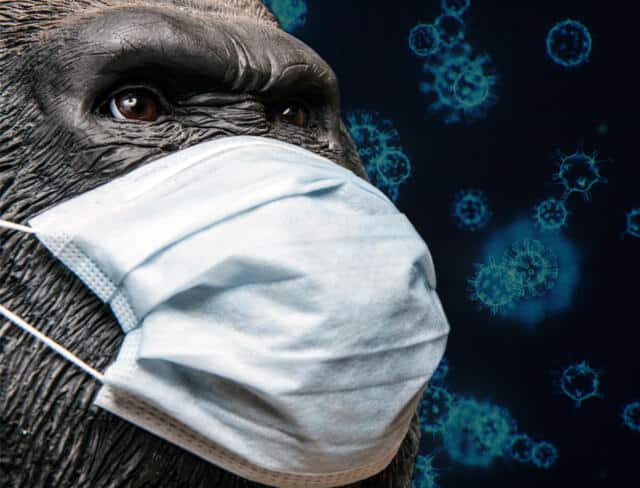written by:
reviewed by:

Stop Spreading Germs.
Germs are terrible. You’ve known this fact since childhood, but it’s only recently lurched into the forefront of pretty much every screen and conversation and grocery run in your life. You’ve discovered that, despite being a fully-fledged grown human with a job and friends, you are also an overripe skunk ape with disgusting habits. So, how do you stop spreading germs?
Good hygiene has come to everyone’s attention in this pandemic. We know we need to wash our hands, sanitize, and wear a mask. But there are more ways to fight infection. Try these six tips exhaustively researched by a guy who is not a doctor and who is also currently sneezing all over this post.
1. Avoid sick people’s germs
This is vital. Sick people are riddled with germs. Their rooms are filled with a putrid miasma you might accidentally breathe in if you go in there so DON’T GO IN THERE! Of course, sometimes you have to. Sometimes those sick people are your kids or your husband or your barista so, yeah, you have to be in the same room with them. Depending on how sick they are–and how susceptible you are—protect yourself accordingly.
2. Wear a mask
Get creative. Wear a batman mask. Wear this horse head mask (be sure to wear a mask under the horse head). Just please cover your virulent visage. Masks are remarkably effective barriers to airborne particles—depending on the mask. A P95, the Cadillac of disposable masks, is (surprise) block 95% of all airborne particles larger than 0.3 microns. You’ve probably seen the videos of people sneezing, which may be the first time you’ve ever seen the droplets of a sneeze (I’m not writing mucus) travel up to 25 feet and look, you’re putting on a mask right now. Perhaps more importantly, wearing a mask protects others from YOU.
3. Wash your hands
Once again, your mom was right. The novel coronavirus has shamed us all as reprobate scrubbists, producing countless remedial videos after discovering most of us haven’t washed our hands—not really—since we were five. It’s important. Not just because your digits are dirty, but because you shove them into your face about 23 times an hour. You’re doing it now, aren’t you? Stop that! Germs ride on our fingertips all the way to our face holes, which, for a germ, is like a vacation in the Maldives. It’s moist, humid, warm, and someone brings you free Mai Tais (your results may differ, I’ve never been in your nose). And if you think your fingertips are gross, then don’t read this 1988 study about what lives under your nails because [retching noises].
4. Think before you touch
Everything you touch is covered in poop is the title of a 2017 New York Post article citing various studies that proved the title was not exaggerating in the least. Seriously, as a dedicated journalist and staunch promoter of science, I have decided to live on the moon because the earth is basically a toilet. Only I can’t even do that because of Neil Armstrong’s famous quote, “I left bags of poop on the moon.” So did every Apollo Mission after until there are now 96 bags of human waste in the Sea of Tranquility. That’s how much poop there is here on earth. We had to outsource to another planet. Try to touch something that isn’t pasted with crap:
- Your phone: A U.K. study found that 16% or 1 in 6 cells was contaminated with human fecal matter.
- Your TV remote: It is crawling with germs, and not just yours. If you travel for a living, then you’re probably suspicious of hotel rooms—and rightfully so. But it’s not the sheets or the toilet seat you should worry about. It’s the remote. WebMD reports a remote is home to at least 70 bacteria per square inch.
5. Sleep more
A rested body is a healthier body and a healthier body fights infection better. But there’s a more sciencey reason sleep helps fight infection. While you sleep, your body releases cytokines, the cells which direct antibodies and WBC to areas of disease in your body. They’re literally the body’s frontline for fighting infection so, like, fall asleep already.
6. Vaccinate
Immunization isn’t just for children. Adults can and should be vaccinated. Like getting a flu shot or, we all hope, soon, please, a COVID-19 shot. Not only should you get a seasonal flu shot, but you should also find out if you were vaccinated against whooping cough, tetanus, diphtheria, and if you’re receiving mail from AARP, maybe the shingles and PCV13 and PPSV23.
Look, you’re not a skunk ape. I’m sorry I said that. I’m also sorry I implied you have a microbial zoo underneath your nails (you do, and handwashing won’t help). I mean, I don’t know you. But the statistics are becoming pretty clear that we live in a planetary petri dish, so follow these tips and ask your doctor about it and go to YouTube University to get your degree in keeping clean to avoid spreading germs.
Image © iStockphotoThe information provided on Health Food Radar is intended for general informational purposes only. While we strive to offer accurate and up-to-date content, we do not provide medical advice, diagnosis, or treatment. Always consult with a qualified healthcare professional before making any dietary or lifestyle changes, especially if you have underlying health conditions or concerns.



